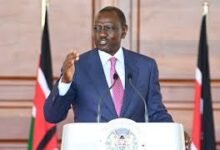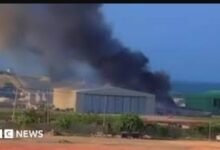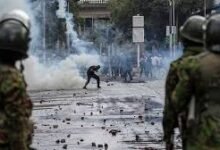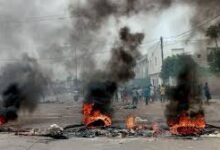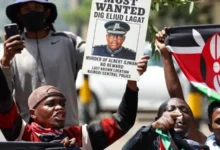‘Sudan army will not attack protesters’

The head of Sudan’s military transitional council has told the BBC the army will not use force against protesters who want it to leave power.
Lt-Gen Abdel Fattah Abdelrahman Burhan spoke as African leaders extended their ultimatum for the military to organise a return to civilian rule.
The army had warned it would remove protesters camped outside its headquarters in the capital, Khartoum.
President Omar al-Bashir was ousted from power on April 11 after 30 years.
Protesters accuse the military of being “remnants” of the ousted long-time ruler.
Leaders of the protest movement have suspended transition talks and co-operation with the military because they doubt its sincerity to hand over power.
A mass sit-in outside the military Headquarters (HQ) has been taking place since April 6. Five days later Mr Bashir was overthrown and replaced by a military council that promised it would relinquish power to civilians within two years, a proposal rejected by protesters.
Lt-Gen Burhan told the BBC HARD Talk programme that the military had taken control to ensure security in the country.
“Protesters have a right to demonstrate anywhere, and we want to reach an agreement [to hand over power], we are not here to stay. The army will go back to the barracks,” he said.
He added that he was willing to hand over power within days if a consensus can be reached with civilian groups.
Meanwhile, African leaders meeting in Egypt have agreed to extend the African Union’s (AU) 15-day deadline, for the Transitional Military Council (TMC) to give power to civilians, to three months.
“We agreed on the need to give more time to Sudanese authorities and Sudanese parties to implement these measures,” said Egypt’s President Abdel Fattah el-Sisi, who chaired the meeting.
Failure to meet the AU’s deadline could see Sudan suspended from the continental body – a situation that would complicate its political and economic crisis.
In December 2018, the government tried to stave off economic collapse by imposing emergency austerity measures and a sharp currency devaluation.
Cuts to bread and fuel subsidies sparked demonstrations in the east over living standards, but the anger soon spread to Khartoum.
The protests quickly widened into demands for the removal of President Bashir, in charge for nearly 30 years, and his government.
-BBC

